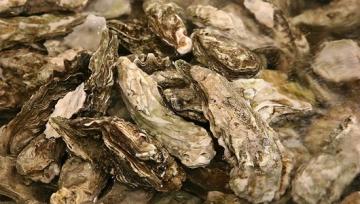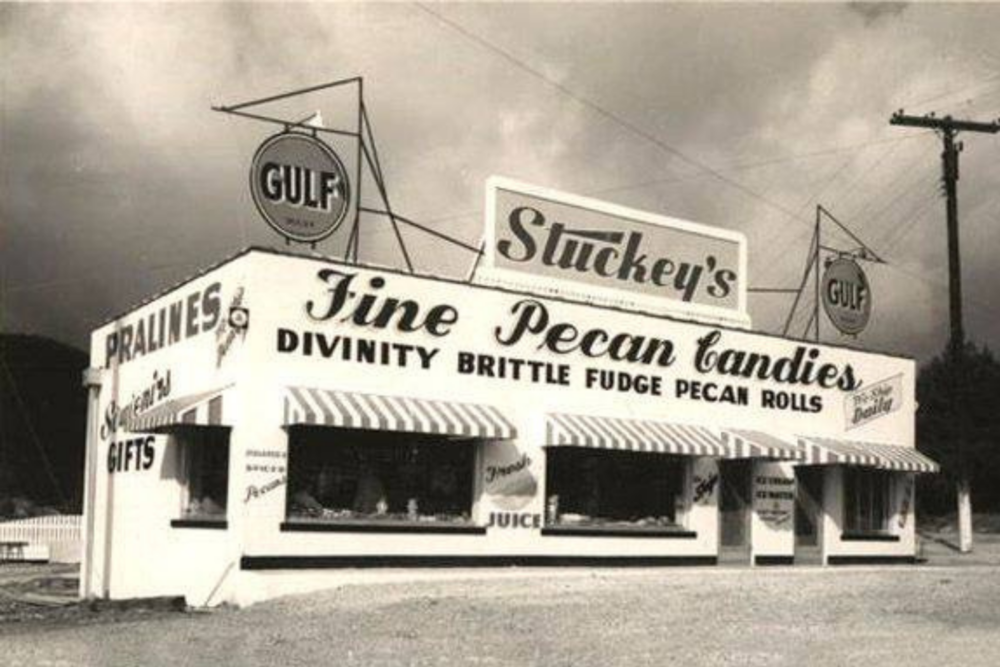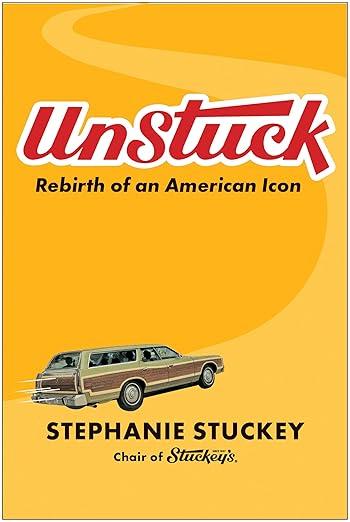
Section Branding
Header Content
Georgia Today: Lawmakers attend Biennial Institute; Oyster farming zones; Getting Stuckey's 'Unstuck'
Primary Content
LISTEN: On the Dec. 11 edition of Georgia Today: Lawmakers gather in Athens to talk priorities ahead of next year's legislative session; state officials are creating a special zone for oyster farming in Glynn County; and getting the famed Stuckey's brand "Unstuck;" we'll talk about the pecan log roll empire with its new CEO.

Orlando Montoya: Hello and welcome to the Georgia Today podcast from GPB News. Today is Wednesday, Dec. 11. I'm Orlando Montoya. On today's episode, lawmakers gather in Athens to talk priorities ahead of next year's legislative session. State officials are creating a special zone for oyster farming in Glynn County. And getting the famed Stuckey's brand unstuck. We'll talk about the pecan log roll empire with its new CEO. These stories and more coming up on this edition of Georgia Today.
Story 1:
Orlando Montoya: U.S. House Speaker Mike Johnson says funding for Hurricane Helene relief will be part of a stopgap government funding measure expected to pass by Dec. 20. That's the deadline for Congress to approve a temporary budget extension to avoid a government shutdown. Savannah congressman Buddy Carter says Johnson made the pledge today in a meeting with representatives from states hard hit by the storm. While some conservatives have called for the spending to be offset by cuts elsewhere in the budget, Carter says that's not a dealbreaker for him.
Buddy Carter: I would love to see offsets on this, but the point that we had to make to the speaker today is that we've got to have this relief. We've never had offsets for emergencies before. But with or without it, the people in our districts need this help and they need it yesterday.
Orlando Montoya: President Biden has requested $100 billion in emergency spending. Meanwhile, state lawmakers are pledging quick adoption of a state-level relief package in the General Assembly that begins next month. Georgia House Speaker Jon Burns said yesterday such a package could look a lot like the one lawmakers passed after Hurricane Michael hit the state in 2018.
Jon Burns: We'll need to be proactive and get to it very soon in the session.
Orlando Montoya: After Michael, lawmakers approved a $470 million package aimed largely at Georgia agriculture. Burns made his comments as new and returning state lawmakers gathered in Athens to learn more about the legislative process. GPB's Sarah Kallis reports.
Sarah Kallis: The Biennial Institute at the University of Georgia is a three day event. It ended Tuesday with an address to lawmakers by Gov. Brian Kemp, who spoke about his top priorities, including Hurricane Helene relief. He says relief will include budgetary and legislative solutions.
Brian Kemp: For weeks, my team has been speaking with leadership from both chambers and crafting a state relief package that our present the first week of the new session.
Sarah Kallis: Kemp says tort reform will also be a priority, citing a challenging legal environment for small business owners. The 2025 legislative session starts on Jan. 13. For GPB News, I'm Sarah Kallis in Athens.

Story 2:
Orlando Montoya: The Georgia Department of Natural Resources is creating a special zone for oyster farming in Southeast Georgia's Glynn County. GPB's Benjamin Payne reports.
Benjamin Payne: 30 acres of marshland just west of Jekyll Island will be designated as a so-called mariculture zone starting next year. Mariculture is the farming of coastal shellfish, in this case oysters that grow underwater. Under the Georgia DNR's proposal, oyster beds on Jointer Creek will be boxed in by concrete barriers protecting them from passing boats. DNR spokesman Tyler Jones says the barriers will also be equipped with strobe lights and reflective signage.
Tyler Jones: The benefit of having them marked like that is that they'll go on navigational charts that the National Oceanic and Atmospheric Administration puts out and there'll be a notice to mariners about it as well. So it's kind of like knowing the rules of the road.
Benjamin Payne: The DNR will divvy up the Glynn County mariculture zone into three plots awarded by a lottery. Oyster farmers have until Jan. 21 to apply. For GPB News, I'm Benjamin Payne.
Story 3:
Orlando Montoya: A former Georgia district attorney charged with interfering in the police investigation into the 2020 killing of Ahmaud Arbery has made her first appearance in court. Jackie Johnson was the state's top prosecutor based in Brunswick. She came to court today as a defendant more than three years after being indicted for violating her oath of office.
Story 4:
Orlando Montoya: George's Register of Historic Places now has six new listings. The designations bring state historic preservation tax incentives. Stephanie Cherry-Farmer of the Georgia Department of Community Affairs says one listing aims to protect the Tuxedo Park Historic District in Atlanta. That's a neighborhood that includes the Georgia governor's mansion and large residential homes by prolific architects.
Stephanie Cherry-Farmer: They can potentially take — they can offset 25% of the cost of rehabilitation of a contributing house in the Tuxedo Park District as a credit on the state income taxes. Which means, baseline, there's now a financial incentive for the preservation of historic houses.
Orlando Montoya: Other listings include the Pine Tree Tea Room in Northeast Georgia's Rabin County, the Ralston Hotel in Columbus, and the Ash Farmhouse in Southeast Georgia's Effingham County.
Story 5:
Orlando Montoya: The U.S. House today is considering a bill to reauthorize defense spending. The nearly $900 billion measure includes servicemember pay raises and nearly $400 million for military construction projects in Georgia. Those projects include family housing at Fort Eisenhower, near Augusta, and an expansion of a Trident refit facility at Kings Bay Naval Submarine Base on Georgia's coast.
Story 6:
Orlando Montoya: Georgia's Peach Drop is officially back for New Year's Eve. Atlanta Mayor Andre Dickens today announced details for the on-again-off-again celebration in downtown Atlanta. Radio and TV personality Ryan Cameron will emcee the event featuring rapper Big Boi and indie rockers Neon Trees. Atlanta City Council approved a $650,000 agreement to pay for the event in October.
Story 7:
Orlando Montoya: Oscar-winning actor Jamie Foxx is sharing what happened after suffering an emergency in Atlanta last year. In his Netflix special, Jamie Foxx's What Had Happened Was..., the actor reveals he had a brain bleed that led to a stroke. After the debut yesterday, Foxx took to his Instagram account to thank Atlantans for their support of the special.
Jamie Foxx: I want to thank the city of Atlanta that was in that audience, man, and supported me and listened to my testimony. I ain't been on stage officially in like 18 years. But you know, Atlanta made it feel like, man, I ain't — I ain't lost a step. They were gracious. They were kind.
Orlando Montoya: He was treated at Piedmont Hospital. Foxx said he and his family were mum on the details because they, quote, "didn't want his fans to see him like that."

Story 8:
Orlando Montoya: Stephanie Stuckey comes from a Middle Georgia family with a recognizably sweet last name. In the mid-20th century, hundreds of Stuckey's stores welcomed road-weary travelers nationwide with their recognizable teal roofs, kitschy gifts for sale and a confection practically synonymous with the Stuckey's name, the pecan log roll. Eventually, the family sold the company; Its stores withered and closed. But in 2019, Stuckey, the granddaughter of company founder Sylvester Stuckey, bought the company back. And she's written a book about the experience of turning the family business around. It's called Unstuck. And Stephanie joins me now to talk about it. Thanks for coming to GPB.
Stephanie Stuckey: Thanks for having me.
Orlando Montoya: The once-huge Stuckey's chain was in very bad shape in 2019. Why did you want to buy it?
Stephanie Stuckey: It's a really simple reason: It was for sale. I literally got a phone call one day, minding my own business, pursuing a career that I was very happy with. And I learned that the company was for sale. But the deeper reason is that I loved my grandfather. Not to sound egotistical, but it wasn't just special for me. It was a whole generation of people that road tripped, just like I did with my family, and stopped at Stuckey's. And I thought, "some things are worth saving."
Orlando Montoya: I called your experience a turnaround, but you've been pretty honest in the book about all aspects of the company. How well is Stuckey's doing?
Stephanie Stuckey: We're making it. We are turning it around. It's an active verb.
Orlando Montoya: And so the reality is, right now you have a dozen stores or more.
Stephanie Stuckey: There are a dozen original Stuckey's stores still standing. We have some more that are licensed. It gets a little murky and legal, and I can geek out on that. But the big picture is that there are licensed stores and they pay us a fee to use our name and we sell them product that represents a small portion of our overall revenue. The bulk of how we're reviving the company and making money is we bought a candy plant in Wrens, Ga., and we're making pecan snacks and candies and selling them to thousands of retailers.
Orlando Montoya: Yeah, you actually pivoted Stuckey's from gas, gifts and candy stores to candy in stores.
Stephanie Stuckey: That's right. Yeah.
Orlando Montoya: So what's your thinking behind that change?
Stephanie Stuckey: Well, it was reality. I had to figure out how on Earth am I going to take, which frankly, at the time was the dumpster fire of a business. We were hemorrhaging cash. We were six figures in the red, and I had to turn it around. And I had this epiphany moment that I talk about in the book where I went to a Stuckey's. I went on a road trip. We're a road-tripping brand. And I thought, "well, I'm going to go tour my pecan log roll empire" and visit what's — what's left of the stores. And what I found, unfortunately, were quite a few stores that had seen better days. Now, there's some out there that look amazing. But I went to a store. It was falling apart and I just thought, this this is not good. And we were continuing to get further in debt. And I went in the store and I saw people were still buying product. And that was kind of my my gosh, that's the "a-ha" — we can make product. And I pulled together the financing. I got some business partners and we got an SBA loan and we bought a manufacturing facility.
Orlando Montoya: Your grandfather, the company founder, Sylvester Stuckey, is a key figure in this story. What aspects of his rise from roadside pecan seller in Eastman to convenience store titan have you embraced in your management style?
Stephanie Stuckey: There's a couple lessons I learned from his story. And what I like to say is I respect the past, but I don't live in it. But when you have a legacy brand, your roots is — it's always part of what you do. I think one of the most important lessons I learned was how you have to embrace change and accept when things are different and your business model isn't working anymore. The best example of that for him was when the interstate highway came along. Stuckey started on Route 66, the Dixie Highway, the Jefferson Highway, the Lincoln Highway and the interstate came along and he had to make a really difficult decision to move his stores to the interstate. So when I was trying to figure out how am I going to revive the brand, I realized I had to change our business model or we weren't going to survive.

Orlando Montoya: You write about how the dynamics of a family-owned business can be toxic, especially for firstborn males. You're obviously not a firstborn male —
Stephanie Stuckey: No.
Orlando Montoya: — and you actually grew up in Washington, D.C., if I'm — if if I'm right. Right?
Stephanie Stuckey: Yes.
Orlando Montoya: And so that's far from where the family name is well known. But you still felt the weight of your family gaze. How did that affect your decisions?
Stephanie Stuckey: Having the last name Stuckey was absolutely part of my decision because throughout my life, people would say, my gosh. Stuckey Are you related to those stores on the side of the road? And what was incredible about that is they wouldn't just say, are you related to that, that business — they always had a story. And a story is the way we connect with each other as humans. That's an emotional bond. And they would say something incredibly personal. Like, one person told me they learned to read because they were the youngest of like 10 kids and so you fend for yourself when you're the youngest in a big family. And she said she would read the billboards and that's how she learned to read. And I was like, "wait, so was your first word 'exit now?'"
Orlando Montoya: So what I got from those chapters were that you weren't expected to do this revival, right?
Stephanie Stuckey: I was not.
Orlando Montoya: You were not the firstborn male.
Stephanie Stuckey: No.
Orlando Montoya: So this was something that you took on because of a passion and an optimism that you had.
Stephanie Stuckey: That, and also, frankly, I was the last one standing. I learned that my — the people, when they — when the company was for sale, that they approached all the other grandchildren before me. And I'm — I'm No. 5 of seven. So they even went out of order.
Orlando Montoya: And your father actually tried to discourage you from it?
Stephanie Stuckey: Yes. Yes, he did. I talk about that in the book. He — he sat me down and he said, "you've never even run a lemonade stand. What makes you think you can run Stuckey's?" Said with love. But I think anyone who's had to navigate complicated family dynamics in a business setting can relate to that situation. Honestly, he was right. I didn't even know how to read a balance statement. I didn't know that parentheses around a figure meant that you were in the red. You know, I mean, it was just embarrassing how little I knew. So he was right. But I think sometimes people telling you you can't do stuff makes you want to do it even more. People saying, "well, you're the last pick." You got a bit of a chip on your shoulder and you use that.
Orlando Montoya: You actually got Stuckey's its own candy-making facilities in Middle Georgia, again. Even its own pecan farms. I have to ask, how are they doing after Hurricane Helene?
Stephanie Stuckey: Not good. Thank you for asking. So the pecan farms are separate from the corporate entity, but my family owns a pecan orchard, and my business partner is a third-generation pecan farmer. And so we are deeply rooted, literally, in the pecan business. And we were badly impacted. And I think what's hard, particularly for pecan farmers, is that our harvest comes right at the same time as hurricane season. So about 40% of this year's crop is damaged. So, yeah, it's hard. We took a hit. We're resilient, though.
Orlando Montoya: I read that it's every like it takes seven years.
Stephanie Stuckey: Yeah. Seven years to be — for a new crop for — you know, if you plant new trees takes seven years for them to be really viable commercially. And so Hurricane Michael was 2018. We were just recovering.
Orlando Montoya: Well, God bless all the farmers. God bless all the farmers and your workers in the plant and everywhere.
Stephanie Stuckey: Yes. Thank you. We need prayers. We need help. We need — we need support.
Orlando Montoya: Well, Stephanie Stuckey is CEO of Stuckey's — famous for pecans and candies — and author of Unstuck: Rebirth of an American Icon. Thanks for joining me.
Stephanie Stuckey: My gosh. It's been so much fun. Thank you.
Orlando Montoya: And that's it for today's edition of Georgia Today. If you'd like to learn more about books with Georgia connections, check out our podcast Narrative Edge. That's the podcast where GPB's Peter Biello and I talk about books and authors with Georgia connections. That's where you'll hear us talking about Stephanie Stuckey's book, Unstuck. Follow us on Facebook and Instagram. Get the latest GPB news anytime at GPB.org/News. Hit "subscribe to this podcast" so you never miss an episode. And if you have feedback, send that to us at GeorgiaToday@gpb.org. I'm Orlando Montoya. I'll talk to you again tomorrow.
---
For more on these stories and more, go to GPB.org/news



